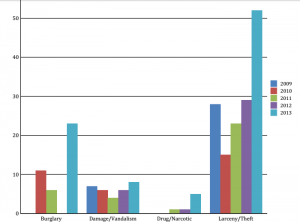Lipscomb has a generally good reputation concerning the amount of crimes that occur on campus.
But, the Tennessee Bureau of Investigation’s 2013 crime statistics show that the school ranks near the top of the list in comparison to nearby colleges with the number of reported burglaries and thefts.
The amount of reported larcenies and thefts have gradually increased from 2010.
In 2013, there were 52 reported larcenies/thefts, while in 2012, there were 29, a difference of 23 reports.
The difference between burglaries and thefts/larceny, as Lipscomb Assistant Director of Campus Security Patrick Cameron described, is a matter of where the crime occurs.
“If you leave your dorm room unlocked, [and] somebody comes in and steals your wallet out of your dorm room, it still counts as a burglary because it’s your residence,” Cameron said.
He went on to say that theft occurs when an possession is stolen from a public place that the thief has permission to be in.
 To the left are the 2013 statistics compared to the past few years.
To the left are the 2013 statistics compared to the past few years.
Sophomore molecular biology major Mark Mitchell was a burglary victim last year. He and his roommate left their door unlocked at night quite often, and the money in his wallet was stolen.
“I had [about] 100, 200 dollars in my wallet, in my desk, tucked away,” Mitchell said.
The thief had walked into his room, taken the money and left.
Though Mitchell was stolen from, his outlook on Lipscomb hasn’t changed. He does, however, encourage students to be more aware.
“People need to be aware,” Mitchell said. “You need to recognize that this is not a bubble. This is the real world, just like any other campus.”
 Vanderbilt, Belmont, Freed Hardeman and Trevecca were the colleges compared to Lipscomb in terms of 2013 crimes (to the left).
Vanderbilt, Belmont, Freed Hardeman and Trevecca were the colleges compared to Lipscomb in terms of 2013 crimes (to the left).
The statistics may or may not surprise students, but in either case, Cameron said that there generally is no perfect protection when it comes to crimes on Lipscomb’s campus.
“If you take our [crime] stats compared to most universities, you will find that we don’t have necessarily the same amount, but at the same time, we’re not immune,” Cameron said.
“Despite everybody’s thoughts, this isn’t the Lipscomb bubble. There isn’t a dome around us that keeps out the outside world.”
To Samantha Gwinn, a freshman elementary education major, the statistics don’t displace her trust in her surroundings.
“Looking at those statics, some of those numbers are very worrisome, but overall, I just feel like Lipscomb is a lot safer than most places,” Gwinn said. “I have never once felt threatened here.”
Cameron said that in terms of theft and burglary, Lipscomb is comparable to other colleges in town. However, the school does not have many accounts of violence.
In 2013, there were no reports of assault or sexual assault at Lipscomb, which Cameron said is a blessing.
This differs from national average for these offenses.
“In contrast to a decrease in [2012’s] study, the overall category of ‘Sex Offenses—Forceable’ increased by 25% in 2013,” said a study done by TBI.
Cameron said that the increase in the category is most likely from an increase of reporting. He said that there is a bad stigma that accompanies sex offenses, so more reports of the crime emerge every year.
There have also been five accounts of drugs/narcotics violations, and Cameron said that Lipscomb is not immune to any violations of the sort because the school is in the city, despite the university’s policies on the subject.
“Anything that happens in the general world is going to happen here,” Cameron said. “It may not take on the exact same forms, but as we all know, [in] Nashville, you can find anything you want to find.”
Cameron said to always consider that each situation, drugs involved or otherwise, is changing the life of a person.
“Every situation involves real people, with real families, with real impacts. They’re a person, not a number,” Cameron said. “If we can get them help, get them into a program without endangering the well-being of others, that’s our first goal. We want to see them change for the better.”
Cameron and the security department encourage students, faculty and staff to help them in keeping Lipscomb a safe environment, which starts with awareness by the members of the environment.
“We use what resources we have, and we encourage the students, the faculty and staff to help us by providing that extra set of eyes for us,” Cameron said.
He is also confident in security’s current state.
“We do think we are blessed comparatively to most places,” Cameron said. “I feel good about what we’re doing. You’ll never get 100 percent. If you do, it’s just because things haven’t been reported.”
Security does what they can, Cameron explained, but they will not have a set of eyes everywhere, considering there are over 4,500 students to 21 security employees, as Cameron said.
For situations like walking at night, campus security has set up 22 call boxes and towers around campus. They are primarily in parking garages, where they would be most used.
Cameron also encourages students who don’t feel safe to take part in the Bison Walk Program. The program gives a student an escort by a member of security to their destination.
Because most of the crimes on campus are petty theft, and students generally feel safe, Cameron reminds students, faculty and staff to not become complacent.
“Even though it is a safe environment, take the right precautions,” Cameron said.
“If we can help the person take the right precautions, they are less likely to be a victim.”
Erika Thornsberry, Erin Turner, Janice Ng and Jesica Parsley all contributed to this story.
Photo credit: Cory Woodroof

